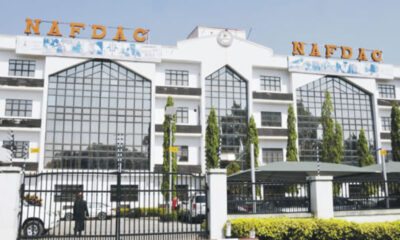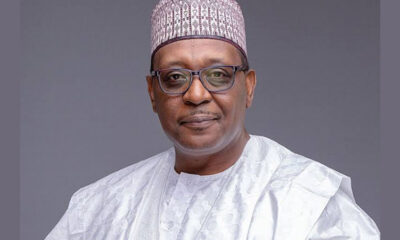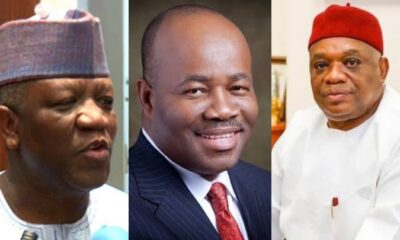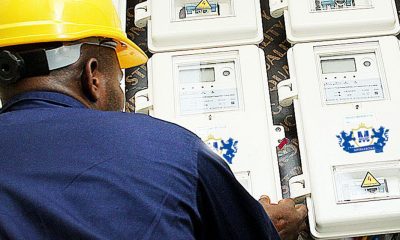Business
Orji: How NSIA Crashed Fertiliser Prices from N13,000 to N5,500

•Says subsidy slumped from N76bn to N2bn
The Managing Director of the Nigeria Sovereign Investment Authority (NSIA), Mr Uche Orji, yesterday disclosed that the restructuring of the Presidential Fertiliser Initiative (PFI) led to a crash in fertiliser price from N13,000 to NN5,500.
Speaking at the BusinessDay Breakfast Meeting in Abuja, with the theme: “Macroeconomic Outlook, Innovation and Technology,” Orji noted that the subsidy that was hitherto paid by the federal government on the commodity had fallen from N76 billion to N2 billion.
The NSIA MD, who spoke on the need to pay more attention to how technology could be applied to all sectors of the Nigerian economy, pointed out that with the cleaning up of the system, today, Nigeria has an excess of 10 million bags of the product.
With the programme now handed over to the private sector to manage, Orji stated that any pressure it posed to the balance sheet of the NSIA has now been removed.
“In agriculture, we have done two or three things. But one of the things we have been working on and which proved controversial in some aspect for the last five years, is that the NSIA has been in charge of the presidential fertiliser initiative.
READ ALSO:
- Enugu ‘King of Satan’ with 59 wives, 300 children dies at 74
- Housewife, 4 others kidnapped while returning from market in Kogi
- Shehu Sani slams NASS for approving Buhari’s loans without hassle
“A few key points just so that you understand the impacts of this programme. When we started the PFI programme, there were only four fertiliser plants in Nigeria. The subsidy bill that was established was N76 billion. Fertiliser was N13,000 a bag and it was scarce.
“Twelve months after this programme, fertiliser prices dropped to N5,500. We had 20 blending plants working in the country and the subsidy bill was only N2 billion.
“We have now restructured the programme and taking it off our balance sheets, put it back in the hands of the lenders, make people put bank guarantees on it and put up cash so we took pressure off the NSIA balance sheet last year,” he said.
Admitting that many people did not like the restructuring programme, Orji noted that the move had completely transformed the sector.
“The restructuring that we did, we went from a subsidy to now running a plus N5 billion profits on that programme, 52 blending plants in the country, we have 20 million bags of fertilisers , we have 10 million in inventory, excess fertiliser within the country.
“But we are now out. We’ve taken the sector, restructured and we have handed it back to the private sector,” the NSIA boss stressed.
In addition, Orji noted that the other thing, NSIA did in terms of agriculture was to embark on a demonstration farm in collaboration with another company to build a farm in Nasarawa state.
“These are not Genetically Modified Organisms (GMOs), we made sure we had the right farming practices. So it’s one of the things we’re doing in agriculture and we are going to be running the special agricultural processing zones. That’s also a programme that we will announce next year,” he stated.
READ ALSO:
- You’re lying, selling out Yoruba race to make Tinubu president, Pa Adebanjo slams Akande
- Monguno lists religious groups ‘backing terrorism’ in Nigeria
- 2023: I am still consulting, says Tinubu
In his remarks, the Minister of Science, Technology and Innovation, Dr. Ogbonnaya Onu, lamented that for too long, the nation had not effectively utilised the strong relationship between science, technology and innovation and business.
“Science, Technology and Innovation (STI) serve as the mother of business. It will be difficult for business to thrive without the effective deployment of STI,” he posited.
He explained that agriculture was at least 80 per cent dependent on STI, whether in plants or livestock, the production of seeds that are high yielding, disease resistant and climate smart.
According to the minister, countries with the largest economies in the world, are those that effectively deploy STI to nation building.
Hence, for business to grow faster in Nigeria, and for the private sector to be stronger than they are today, Onu opined that the country needs to effectively deploy STI to nation building.
“The federal ministry of science, technology and innovation is ready and prepared to work with the business community to make our economy stronger, our nation greater and Nigerians happier.
“This is the best way to ensure that we create new jobs, feed ourselves, improve our economy, reduce poverty and recreate the middle-class and make the nation self-reliant for the good of all,” he noted.
Also speaking during the programme hosted by the Publisher, BusinessDay Media Limited, Frank Aigbogun, the Managing Director of the company, Dr. Ogho Okiti, argued that Nigeria has a balance of payment crisis.
Added to that, he explained that the macro-economic instability would not allow any appreciable growth in Nigeria, arguing that there cannot be recovery until the issues were properly situated and sorted out.
“Private investment will not come in when all these things are misbehaving the way they are doing at the moment, including double digit inflation,” he noted.
Thisday
Railway
Lagos Rail Mass Transit part of FG free train ride – NRC

Lagos Rail Mass Transit part of FG free train ride – NRC
The Nigerian Railway Corporation (NRC) has disclosed that the Lagos Rail Mass Transit (LRMT) trains are included in the Federal Government’s free train ride initiative for the Christmas and New Year celebrations.
The LRMT, which currently includes the Phase 1 Blue Line Rail and the Phase 1 of the Red Line Rail, operates under the Lagos Metropolitan Area Transport Authority (LAMATA).
This announcement was made by Ben Iloanusi, the Acting Managing Director of the NRC, during an interview on NTA News TV on Friday, following the launch of the initiative earlier that day.
While Iloanusi stated that Phase 1 of both the Blue Line and Red Line Rail projects are part of the program, LAMATA has yet to confirm this inclusion.
READ ALSO:
- Nigeria denies alleged plot to destabilise Niger Republic
- Navy arrests 19 Nigerians attempting to reach Europe by hiding on ship
- Troops arrest four Ambazonian rebels in Taraba
Iloanusi outlined the other routes benefiting from the scheme, which include the Lagos-Ibadan Train Service, Kaduna-Abuja Train Service, Warri-Itakpe Train Service, Port Harcourt-Aba Train Service, and the Bola Ahmed Tinubu Mass Transit in Lagos. Notably, little was previously known about the Bola Ahmed Tinubu Mass Transit service until this disclosure.
“Let me mention the routes where this free train service is happening. We have the Lagos-Ibadan Train Service, we have the Kaduna-Abuja Train Service, we have the Warri-Itakpe Train Service, we have the Lagos Rail Mass Transit trains, we have the Port Harcourt-Aba Train Service, and we have what we call the Bola Ahmed Tinubu Mass Transit, which is also in Lagos,” he stated.
Iloanusi provided operational updates, stating that passengers nationwide can access free tickets online or, for those unable to do so, at train stations where they will be profiled and validated.
He noted that passengers using NRC-managed services (excluding the Lagos Rail Mass Transit) should reserve tickets via the official website, www.nrc.gov.ng, with a valid ID required. He also advised travelers to plan, arrive on time, and bring valid identification.
Lagos Rail Mass Transit part of FG free train ride – NRC
Business
NNPC denies claim of Port Harcourt refinery shutdown

NNPC denies claim of Port Harcourt refinery shutdown
The Nigerian National Petroleum Company Limited (NNPCL) has denied claims in media reports that the newly refurbished Port Harcourt refinery has shut down.
The national oil company denied the claim in a press release issued by its Chief Corporate Communications Officer, Olufemi Soneye, on Saturday.
Soneye said the claim was false and urged Nigerians to disregard it. He stressed that the Port-Harcourt Refinery is fully operational.
READ ALSO:
- Like Ibadan, stampede claim 10 lives for Abuja Catholic church, 17 in Anambra
- Marketers react after NNPCL slashes petrol price to N899 per litre
- Electricity: We installed 184,507 meters, issued 50 licences in Q3, says FG
The statement read, “The attention of the Nigerian National Petroleum Company Limited (NNPC Ltd.) has been drawn to reports in a section of the media alleging that the Old Port Harcourt Refinery which was re-streamed two months ago has been shut down.
“We wish to clarify that such reports are totally false as the refinery is fully operational as verified a few days ago by former Group Managing Directors of NNPC.”
He noted that preparation for the day’s loading operation is currently ongoing, and added that claims of the shutdown are “figments of the imagination of those who want to create artificial scarcity and rip-off Nigerians.”
NNPC denies claim of Port Harcourt refinery shutdown
Business
CBN permits BDCs to buy up to $25,000 FX weekly from NFEM

CBN permits BDCs to buy up to $25,000 FX weekly from NFEM
The Central Bank of Nigeria (CBN) has granted Bureau de Change (BDC) operators temporary permission to purchase up to $25,000 weekly in foreign exchange (FX) from the Nigerian Foreign Exchange Market (NFEM).
The Central Bank of Nigeria (CBN) has granted Bureau de Change (BDC) operators temporary permission to purchase up to $25,000 weekly in foreign exchange (FX) from the Nigerian Foreign Exchange Market (NFEM).
This move, detailed in a circular dated December 19, 2024, is designed to meet seasonal retail demand for FX during the holiday period.
The circular was signed by T.G. Allu, on behalf of the Acting Director of the Trade and Exchange Department.
The arrangement will be in effect from December 19, 2024, to January 30, 2025.
Under the directive, BDCs may purchase FX from a single Authorized Dealer of their choice, provided they fully fund their accounts before accessing the market.
Transactions to occur at the prevailing NFEM rate
The transactions will occur at the prevailing NFEM rate, and BDCs are required to adhere to a maximum 1% spread when pricing FX for retail end-users.
READ ALSO:
- Badenoch’s negative portrayal of Nigeria Police unfair-PCRC
- Bitcoin price crashes to $95,000 as market continues to react to Federal rate cuts
- Bauchi high court dismisses blasphemy, cybercrime charges against Rhoda Jatau
All transactions conducted under this scheme must be reported to the CBN’s Trade and Exchange Department.
The circular read in part:
“In order to meet expected seasonal demand for foreign exchange, the CBN is allowing a temporary access for all existing BDCs to the NFEM for the purchase of FX from Authorised Dealers, subject to a weekly cap of USD 25,000.00 (Twenty-five thousand dollars only).
This window will be open between December 19, 2024 to January 30, 2025.
“BDC operators can purchase FX under this arrangement from only one Authorized Dealer of their choice and will be required to fully fund their account before accessing the market at the prevailing NFEM rate. All transactions with BDCs should be reported to the Trade and Exchange department, and a maximum spread of 1% is allowed on the pricing offered by BDCs to retail end-users.”
The CBN assured the general public that PTA (Personal Travel Allowance) and BTA (Business Travel Allowance) remain available through banks for legitimate travel and business needs.”
These transactions are to be conducted at “market-determined exchange rates” within the NFEM framework.
This initiative reflects the CBN’s strategy to stabilize the FX market and manage seasonal surges in demand.
CBN permits BDCs to buy up to $25,000 FX weekly from NFEM
-

 metro2 days ago
metro2 days agoCourt stops customs from seizing imported rice in open market
-

 Railway13 hours ago
Railway13 hours agoLagos Rail Mass Transit part of FG free train ride – NRC
-

 metro3 days ago
metro3 days agoFG transfers electricity market regulatory oversight in Lagos to LASERC
-

 metro2 days ago
metro2 days agoAfe Babalola: Court grants Dele Farotimi bail, barred from media interviews
-

 metro2 days ago
metro2 days agoIbadan stampede: Tinubu orders probe as death toll hits 40
-

 News2 days ago
News2 days agoAdebayo Ogunlesi, 2 other Nigerians make Forbes 50 wealthiest Black Americans list 2024
-

 metro23 hours ago
metro23 hours agoIbadan stampede: Ooni reacts after arrest of ex-wife
-

 metro2 days ago
metro2 days agoNAFDAC seizes N5bn fake rice, seals factory in Nasarawa











